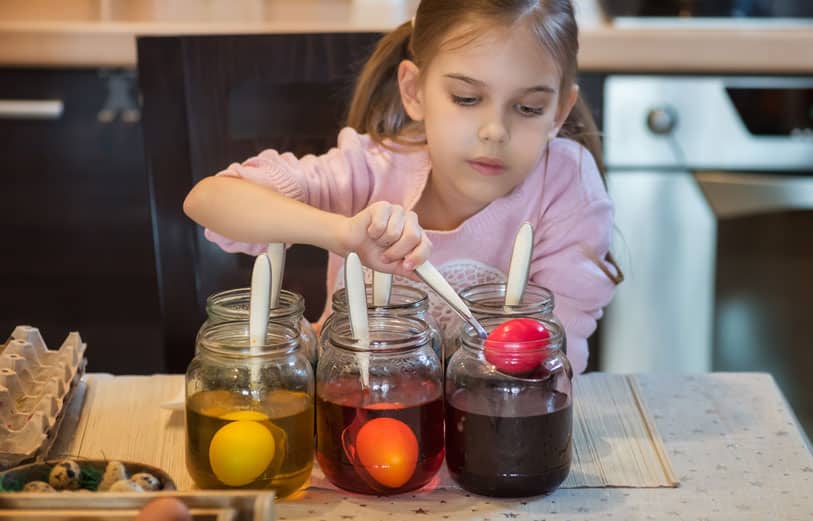Ensuring Easter Egg Safety for a Joyful and Healthy Event

When decorating, hiding, and hunting Easter eggs, it's essential to prioritize food safety to protect your family from foodborne illnesses.
Easter egg safety advice.
Many of us have childhood memories of decorating and hunting “real” Easter eggs.
The U.S. Department of Agriculture's (USDA) Food Safety and Inspection Service offers valuable advice to ensure your Easter egg fun is safe and healthy. Susan Conley, Director of Food Safety Education, underscores the importance of careful preparation concerning hard-boiled eggs.
Purchase quality eggs.
Egg safety starts at the source. The FDA and the USDA regulate United States shell egg producers to ensure their operations meet the necessary safety criteria. In addition, as a consumer, please be sure to:
- Only purchase eggs with clean, uncracked shells from a refrigerated case.
- Refrigerate eggs promptly upon returning home from the grocery store, keeping them in their original carton to maintain freshness.
- Adhere to proper storage and handling practices to ensure egg safety. Raw shell eggs can safely stay in the refrigerator for three to five weeks from the purchase date, even if the "sell-by" date has passed.
Prepare the eggs safely.
- Before preparing the eggs, thoroughly wash your hands and sanitize utensils and surfaces to prevent cross-contamination. Sanitation while cooking, cooling, and decorating the eggs is essential to food safety.
- Next, place raw shelled eggs in a large pan. Cover eggs with cold water. Place pan on the stove with a lid on it. Bring to a boil. Turn off the burner and let set for 15 minutes.
- Finish the eggs by cooling them in cold water. Promptly refrigerate the cooled hard-boiled eggs in a covered container.
Handle Hard-Boiled Eggs with Care.
Eggshells are porous but have a natural protective coating. When you wash or boil shelled eggs, the coating is rinsed away, leaving the shell vulnerable to harmful bacteria.
In order to reduce the risk of contamination, refrigerate hard-boiled eggs within two hours of cooking. Check your refrigerator’s temperature to ensure it stays at 40°F or below for safe cold food storage.
Decorate the eggs safely.
- If you plan to eat the decorated Easter eggs, use “food-grade dye.” Some families prepare separate batches of eggs—one for decorating and another for consumption—to maintain safety standards.
- Follow directions on the dye and decoration product packages.
- Hard-boiled eggs should not be held at room temperature for more than two hours. Therefore, plan your egg decorating accordingly and return the decorated eggs to the refrigerator.
Safe Easter egg hunting practices.
If you must use hard-boiled eggs for your Easter egg hunt, food safety is crucial. Therefore:
- Avoid cracking the eggshells, which could introduce bacteria and contaminate the egg inside.
- Choose hiding places protected from dirt, pets, and other potential sources of contamination.
- Keep hard-boiled eggs chilled in the refrigerator until just before the hunt begins.
- Limit the time for hiding and hunting the eggs to two hours.
- After the Easter egg hunt, refrigerate any "found" eggs to prevent bacterial growth. Eggs left at room temperature for extended periods can pose a risk of foodborne illness.
- Finally, discard any eggs cracked or left out for more than two hours to err on the side of caution. “When in doubt, throw it out.”
Safer yet – Easter egg hunt alternatives.
If the thought of decorating and hiding hard-boiled eggs for an egg hunt is overwhelming, consider the following options:
“Blow out” the eggs
Blowing raw eggs out of their shells is a fun, safe alternative to hard boiling. Although empty eggshells may not withstand an Easter egg hunt, they can be displayed for several weeks. Additionally, you can still use the raw eggs for cooking.
Click here to learn how to blow out raw eggs for decorating.
Play by the numbers.
Keep your decorated hard-boiled eggs safe in the fridge. Instead, number the eggs and hide corresponding numbers (printed on colorful cards) in the same places you would traditionally hide the eggs. Let your “hunters” find the numbers, then give them the decorated eggs that correspond to the number.
“No risk” eggs.
Finally, consider using plastic eggs to eliminate the hassle and risk of using real eggs. The plastic can be filled with little candies, or special messages, or just retrieved for fun. Moreover, plastic eggs can be used year after year and present no risk of foodborne contamination.
Enjoy a fun and worry-free event.
The Moultrie County Health Department encourages you to prioritize food safety as you create cherished holiday memories.
Above all, we wish you and your loved ones a safe and happy Easter season.

